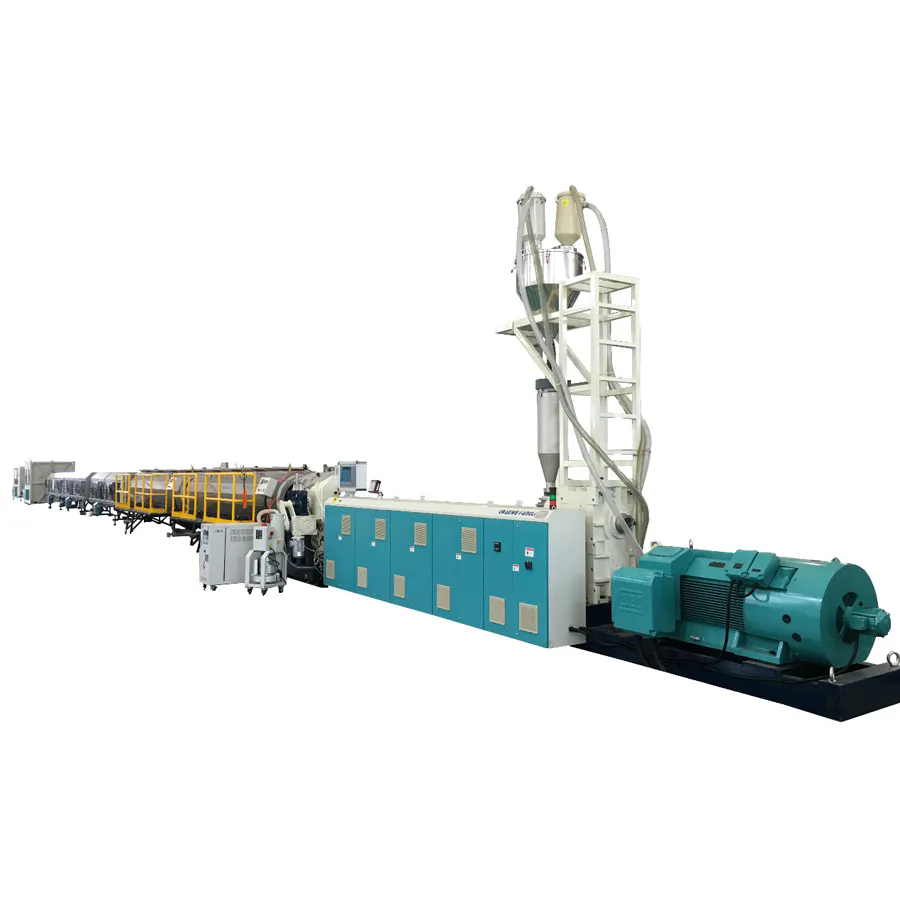What Makes an Extrusion Line for Solid Wall Pipe Essential for Modern Manufacturing?
2024-12-11
The extrusion line for solid wall pipes plays a pivotal role in the production of high-quality piping systems used in a wide range of industries. From construction and water management to agriculture and telecommunications, solid wall pipes are integral to the infrastructure that supports modern society. But what exactly is an extrusion line for solid wall pipes, and why is it so important in today's manufacturing landscape?
1. How Does an Extrusion Line for Solid Wall Pipes Work?
An extrusion line for solid wall pipes is a highly specialized piece of machinery designed to manufacture solid plastic pipes in a continuous process. The process begins with raw plastic material, usually in the form of pellets, which is fed into an extruder. The extruder melts the plastic and forces it through a die, forming it into the desired shape—usually a cylindrical pipe. As the pipe exits the die, it is cooled and solidified before being cut into the appropriate lengths.
The extrusion process offers several advantages over traditional pipe manufacturing methods, including higher production speeds, more consistent quality, and the ability to produce pipes of various sizes and specifications.
2. What Materials Are Used in Extrusion Lines for Solid Wall Pipes?
Extrusion lines for solid wall pipes are versatile and can work with a wide range of materials. The most common materials used include high-density polyethylene (HDPE), polyvinyl chloride (PVC), and polypropylene (PP). Each material has its own unique properties that make it ideal for specific applications. For example, HDPE is known for its durability and resistance to corrosion, making it a popular choice for water and gas pipes, while PVC is often used for plumbing and drainage systems due to its strength and low cost.
The choice of material depends on the intended use of the pipe and the required performance characteristics, such as chemical resistance, flexibility, or impact resistance.
3. Why Is the Extrusion Process So Important in Pipe Manufacturing?
The extrusion process is crucial for producing solid wall pipes because it ensures uniformity and consistency in the final product. Unlike other manufacturing methods, extrusion allows for continuous production, which minimizes waste and ensures a higher degree of precision. This is especially important in industries where pipe quality is paramount, such as in water and gas supply systems.
Extrusion also offers flexibility in terms of customization. With the right equipment and settings, manufacturers can create pipes with specific wall thicknesses, diameters, and lengths to meet the demands of various applications.
4. How Does Automation Enhance the Efficiency of Extrusion Lines?
Modern extrusion lines for solid wall pipes are often fully automated, meaning that they require minimal human intervention during the production process. Automation systems can control various aspects of the extrusion process, such as temperature, pressure, and extrusion speed, ensuring that the pipes meet strict quality standards.
Automation not only improves the efficiency of the manufacturing process but also reduces the likelihood of human error and increases the consistency of the final product. This allows manufacturers to produce high volumes of pipes with minimal downtime and waste.
5. What Are the Key Advantages of Using an Extrusion Line for Solid Wall Pipes?
One of the key benefits of using an extrusion line for solid wall pipe production is the ability to produce pipes at a high throughput rate. Since the process is continuous, manufacturers can create large quantities of pipes in a relatively short period of time. This high efficiency is essential for meeting the growing demand for pipes in various industries.
Moreover, extrusion lines offer the advantage of producing solid wall pipes with precise dimensions and smooth surfaces. This consistency in product quality reduces the need for additional processing and ensures that the pipes fit perfectly during installation.
6. Can Extrusion Lines Be Customized for Different Applications?
Yes, extrusion lines for solid wall pipes can be customized to meet specific production requirements. Manufacturers can adjust the die and extrusion settings to produce pipes of different sizes, shapes, and material compositions. For example, some extrusion lines are equipped with multi-layer capabilities, allowing the production of pipes with layers of different materials for added strength or protection against external elements.
This versatility makes extrusion lines a crucial tool for producing a wide range of pipe types, from simple drainage pipes to more complex, multi-layer pipes used in specialized applications like chemical processing or telecommunications.
7. What Role Does Quality Control Play in Extrusion Line Operations?
Given the high demand for reliable and durable pipes, quality control is a critical aspect of the extrusion line process. Advanced extrusion lines are equipped with in-line measurement and inspection systems that monitor the dimensions, surface quality, and other properties of the pipes as they are being produced.
These quality control systems ensure that each pipe meets industry standards and customer specifications. By detecting any defects or variations in real time, manufacturers can make adjustments to the extrusion process to prevent issues from affecting the entire production run.
8. How Do Extrusion Lines Contribute to Sustainability in Pipe Manufacturing?
Extrusion lines for solid wall pipes contribute to sustainability in several ways. First, the continuous nature of the extrusion process helps reduce material waste, as the process is highly efficient in using raw materials. Additionally, many extrusion lines are designed to recycle scrap materials, reducing the environmental impact of the production process.
The use of sustainable materials, such as recyclable plastics, in the extrusion process also helps reduce the overall environmental footprint of pipe manufacturing. As industries and governments push for more sustainable practices, extrusion lines are evolving to meet these demands and contribute to the circular economy.
The role of extrusion lines in the production of solid wall pipes is undeniably crucial to modern manufacturing. These lines enable high-speed, cost-effective production of reliable, durable pipes for a wide range of applications. With advancements in materials, technology, and automation, extrusion lines will continue to be at the forefront of pipe manufacturing for years to come.



